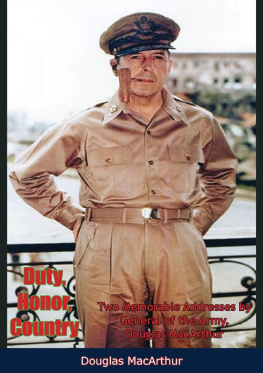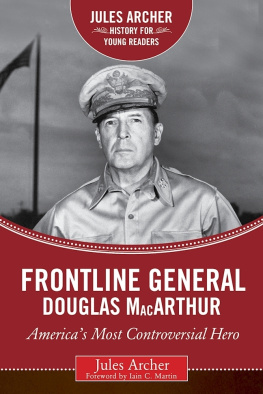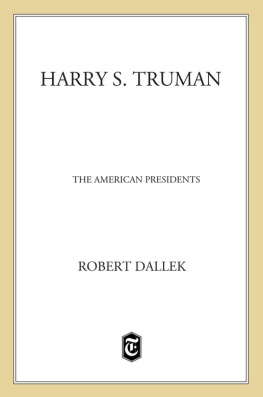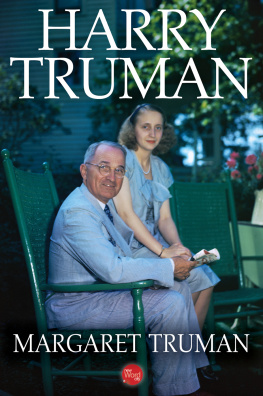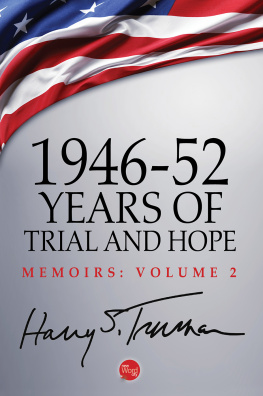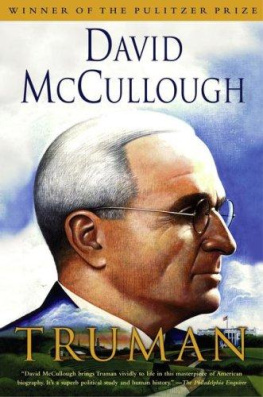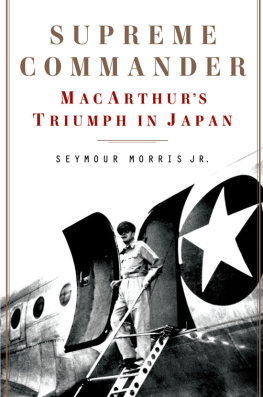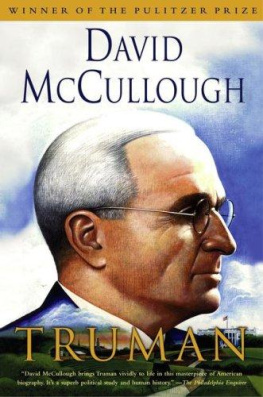General MacArthur
and
President Truman
General MacArthur
and
President Truman
The Struggle for Control of American Foreign Policy
Richard H. Rovere
Arthur Schlesinger, Jr.
With a New Introduction by Arthur Schlesinger, Jr.
Originally published in 1951 by Farrar, Straus, and Giroux
First published 1992 by Transaction Publishers
Published 2021 by Routledge
605 Third Avenue, New York, NY 10017
2 Park Square, Milton Park, Abingdon, Oxon OX14 4RN
Routledge is an imprint of the Taylor & Francis Group,
an informa business
1992 by Taylor & Francis
All rights reserved. No part of this book may be reprinted or reproduced or utilised in any form or by any electronic, mechanical, or other means, now known or hereafter invented, including photocopying and recording, or in any information storage or retrieval system, without permission in writing from the publishers.
Notice:
Product or corporate names may be trademarks or registered trademarks and are used only for identification and explanation without intent to infringe.
Library of Congress Catalog Number: 9141848
Library of Congress Cataloging-in-Publication Data
Rovere, Richard Halworth, 1915
[General and the president]
General MacArthur and President Truman: the struggle for control of American foreign policy / Richard H. Rovere, Arthur Schlesinger, Jr.; with a new introduction by Arthur Schlesinger, Jr. [Transaction ed.]
p. cm.
Originally published: The general and the president. New York: Farrar, Straus, and Giroux, 1951.
Includes index.
ISBN 1560006099
1. MacArthur, Douglas, 18801965. 2. Korean War, 19501953United States. 3. Truman, Harry S., 1888-1972. 4. United StatesForeign relations1945-1953. I. Schlesinger, Arthur Meier, 1917. II. Title.
E745.M3R6 1992
973.918dc20
9141848
CIP
ISBN 13: 978-1-56000-609-1 (pbk)
For George Genzmer and Bernard De Voto Friends and Teachers
Contents
Rereading this book brought back a flood of memories. Richard Rovere and I wrote The General and the President in three or four months in the spring and summer of 1951. We had met a couple of years earlier when research on the New Deal brought me to the Roosevelt Library at Hyde Park. Herman Kahn, the director of the Library and a man of great charm and wisdom (not to be confused with the thermonuclear Herman Kahn), had introduced us, and Rovere and his delightful wife Eleanor soon invited me to stay in their hospitable house in Quaker Lane during my Hyde Park visits.
My research in the summer of 1950 was abruptly interrupted on 25 June when North Korea invaded South Korea. President Harry Truman quickly decided that this aggression required a military response by the United States and other democracies. The United Nations, free for once to act because of Soviet absence from the Security Council, called for the withdrawal of the North Korean forces, and when North Korea refused to comply, set up a U.N. command under the United States to repel the attack. General Douglas MacArthur, the American proconsul in Japan, became commander of the U.N. armies.
A proud and flamboyant personality, MacArthur found himself in due course waging a two-front war: against the North Koreans and soon the Chinese in Korea; and against the Secretaries of State and Defense, the Joint Chiefs of Staff and President Truman in the United States. The second war became almost as public as the first and almost as exasperating. On 11 April 1951 the President fired the General.
As the book recalls, all hell broke loose. MacArthur returned to the United States a conquering hero; Truman became the object of unbridled national denunciation. On 3 May the Senate Armed Services and Foreign Relations Committee opened an extraordinary inquiry into the circumstances of MacArthurs dismissal. MacArthur himself; Secretary of State Dean Acheson; General George C. Marshall, the Secretary of Defense; General Omar Bradley, chairman of the Joint Chiefs of Staff; and other assorted dignitaries underwent a congressional interrogation that in time canvassed the major issues of global strategy.
Dick Rovere and I followed these events with lively interest. The uproar after the Generals return prompted us to write a piece that Harpers published in July called The Second Coming of Douglas MacArthur. By this time the subject had us in its grip, and we decided to collaborate on a book. Averell Harriman, whose special assistant I had been in Paris during the first months of the Marshall Plan three summers before, was now back in Washington as in effect the Presidents national security adviser; and he kept us abreast of thinking in the Truman circle. Dick, who had been writing the Letter from Washington in the New Yorker since 1948, had excellent sources on the Hill.
We were especially indebted to Senator Brien McMahon of Connecticut for transcripts of each days hearings. McMahon, who died in 1952, was a witty man with a beautiful wife and a breezy sense of humor. At one point in his senatorial career he had devoted time and energy to sending the diplomat Phelps Phelps to Pago Pago in Samoa; he also expressed the hope that Phelps Phelps would eventually retire to Walla Walla. McMahon was probably the sharpest questioner among the senators.
The collaboration was a really happy one. I wrote the opening section on MacArthurs career up to Korea; Dick wrote the section on the Korean War; and we worked together on the analysis of the congressional hearings. In fact, we really worked together on the whole book, exchanging drafts and (mildly) revising each others chapters. This accounts for the books uniform texture. Dick was the better writer, and I learned a lot from him in the collaboration. Writing propaganda for the Office of War Information and then speeches for politicians had nourished a weakness for rhetoric. The graceful and ironic precision of Dicks style stirred me to recapture my respect for the word.
Rereading The General and the President also serves as a stimulus to set down second thoughts about the Korean War. Rovere had already done this in his posthumous memoir Final Reports (1984). While he was glad that we had defended Truman against MacArthur, Dick wrote, he now wished that we had examined Trumans position as critically as we had MacArthurs. In retrospect, I think the Truman policy was only slightly less mistaken than the policy MacArthur wanted to pursue. I now think our intervention in Korea was, if not itself a certifiable disaster, a prelude for one. The Korean War, Rovere had come to believe, led directly to the militarization of American foreign policy and indirectly to the disaster of Vietnam. Where was the American national interest in Korea? The confusion then and thereafter of national interest with ideological preferencereflexive anti-communismdid incalculable damage, he contended, to the national interest.
My own second thoughts traverse some but not all of this route. The American assumption in 1950 was that North Korea was a puppet of Moscow and that the invasion had been ordered by Stalin as a test of American will. Had we failed to respond in Korea, it was believed, Stalin would be emboldened to launch new probes and sponsor new acts of aggression. People in Europe and around the globe would be confirmed in their fears that Soviet power was invincible, that American big-talk was bluff, that the U.N. was of no use, that communism was the wave of the future. We thought Truman had to act in order to show that the United States was not a fake and that collective security could be made to work.


